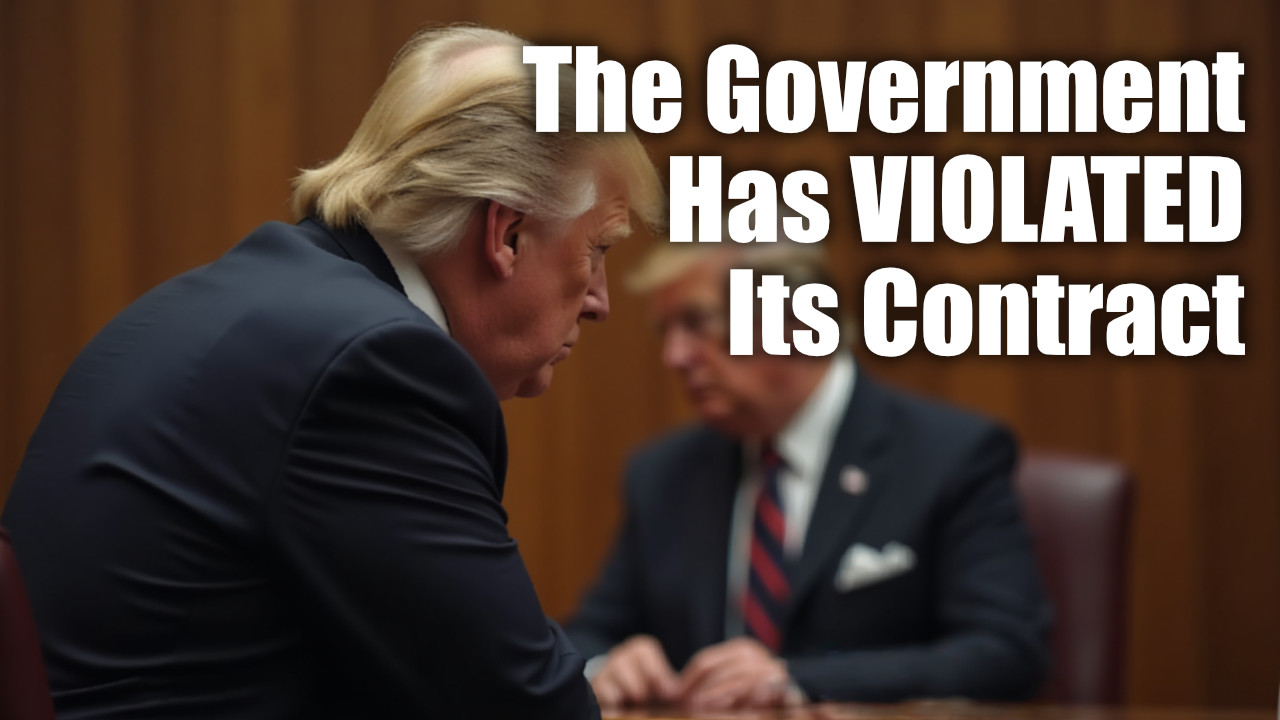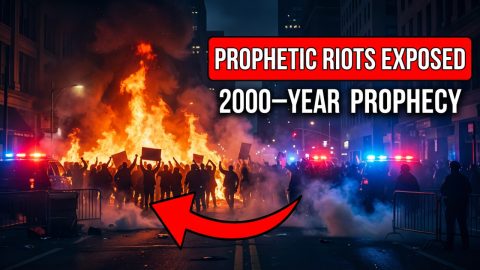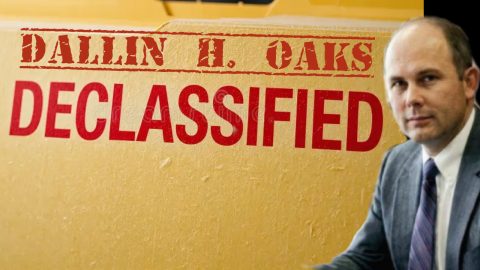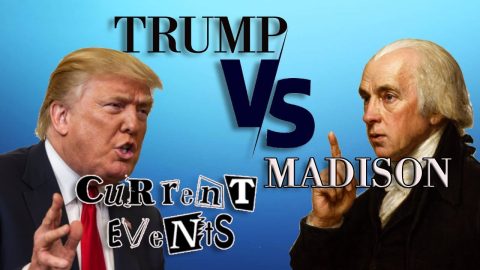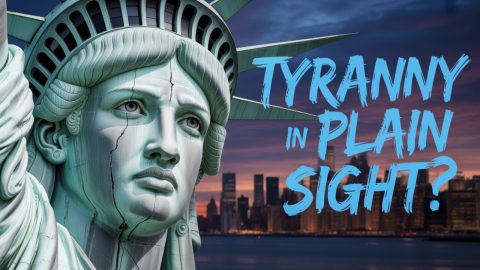In every contract, both parties agree to the performance of certain duties, the violation of which can nullify the contract. The Constitution is just such a contract, and the federal government has violated the provisions that govern its action. What now?
This is an excerpt from Ben McClintock’s keynote presentation at the 2025 Constitution Party convention, entitled “Make America STATES Again!” Watch the whole presentation here: https://youtu.be/eJmEaCCcoL4
Help support ad-free content with a one time donation or becoming a member today.
Thank you to our sponsors
https://connollyandsonsconcrete.com/
https://www.dentistry4health.org
http://www.highercallingfirearms.com
http://www.americanappliancehvac.com
https://insurewithcompass.com/sbarlow.html
TRANSCRIPT
So you have two options, right?
We have one option is to cancel the contract because it’s been violated or you enforce it because the contract has been violated.
And what needs to be understood is that it was not us that violated the contract.
It was the general government that violated the contract by forcing a violation of it.
So what can a state do now that it’s been supposedly passed? Do we just have to capitulate and go along with it, you know, you don’t have to just go along with
it.
That’s what the founding fathers said with the Kentucky and Virginia resolutions and other examples of nullification, you just say no, we’re not going to go along with it.
It’s not the violation of the contract and so it’s no void and we’re just not going to do it.
But there are other options, you know, that you don’t have to leave the union, that you can actually start to enforce the Constitution and that is another option that can be done.
We’ll get into that.
So what a state can do, you had James Madison in Federalist 46.
What he said, right, this is an argument you had Patrick Henry, who is also what was considered an anti-Federalist, saying we were giving too much power to the general government.
And you had James Madison, the Federalist Papers, defending the Constitution saying, “No, we would never, we would have to be insane.”
He says, “What degree of madness would we have to have come to to allow the general government to be so powerful that it takes away the state’s rights.
And so he says, so in Federalist 46, he goes through and he lists the things that can be done for an individual state to withstand the unconstitutional actions of the federal government.
He says that the means of opposition to the federal government going beyond its bounds are powerful and at hand.
So he’s like, it shouldn’t be a difficult thing.
These tools that we have, they are powerful tools, and they’re right next to us.
We can grab them any time we want to. He says the disquietude of the people, their repugnance, and perhaps refusal to cooperate with the officers of the union, the frowns of the magistracy of the state, the embarrassment created by legislative devices, which would often be added on such occasions would oppose in any state difficulties not to be despised.
A correspondence would be opened.
Plans of resistance would be concerted. In the contest with Great Britain, one part of the empire was employed against the other.
The more numerous part invaded the rights of the less numerous part.
So he’s going back to the war for independence that we just went through and saying, we had a much bigger organization coming against us.
And then he’s saying now that, no, we have a much bigger thing.
He says, what would be the contest in the case we are supposing?
Who would be the parties?
A few representatives of the people would be opposed to the people themselves.
So he’s saying it would be the exact opposite.
So it would be much easier because we’d have more people opposing a smaller group of people, and so it would be much easier for us to oppose the government if they went beyond its bounds in the Constitution in this scenario.
So I wanna break this down also into more modern tongues.
We can, you know, disquietude is not really a word that’s used very often today, at least in the circles I run around with, or, you know, repugnance.
I think that the meaning of that has changed a little bit as well, so I wanna just talk those meanings and that will help us to understand what it is our duty is or what are the things that we can do when the government goes beyond its contract.
So talking about disquietude, oh I’m sorry, with this just kind of breaking down what it is that James Madison said in Federalist 46, he says the disquietude of the people, the people’s repugnance and the refusal to cooperate with the officers of the union.
So these are the tools that we have at hand to be able to resist when the contract is being violated.
So now we look at the definitions of these words, disquietude. We go to the dictionary of the time, Samuel Johnson’s dictionary.
That was what the founding fathers would have used.
And it says that it’s uneasy, uneasiness, anxiety, disturbance, wanted tranquility.
So essentially no peace until the tyrants retreat.
So that’s what we’re supposed to do, according to James Madison, is that we are to have no peace, we are to be full of disturbances and wanted tranquility until they back off.
So that’s what disquietude means.
We are to be constantly going after them.
Somebody talks about, you know, one topic and we just bring it right back.
We say, “No, we’re talking about the violation of the contract.”
And then something else comes up again.
We’re like, “No, we’re talking about the violation of the contract.”
How about repugnance?
Today the word means, you know, in most people’s minds, at least in my mind, it’s it’s ugly, it’s gross, right? But that’s not what he meant there in the context of 46.
In Federalist 46, disquietude means something completely different, but I am getting ahead of myself again, and I’m gonna get some more background on how the founding fathers were full of disquietude, how they were full of disturbances leading up to the war for independence.
We have a ten -year period, 1766 to 1776, there were more than 70 recorded incidents of tarring and feathering by colonists against government officials, just right there.
Today, can you imagine the way that our population is today if a single politician was tarred and feathered by the populace, what would the response be?
The founding fathers were of a different breed than we are today, they did 70 in 10 years.
In Berkshire, colonists forced justices of the court from their seats shut up the courthouse and forced the justices from the city so they just ran everybody out of town that was going to be enforcing the tyrannical acts of the crown another thing that they did they said outside of Boston colonists went to the home of another judge and fired shots into his house forcing him out of the city so again you can just imagine what that would be like today because of the the way that we uh Our culture is that this would be seen as unacceptable, but the Founding Fathers said, no, this is how we behave to be able to get government back under control.
This is something that most people in America believe that they support the Founding Fathers.
They love what the colonists did to be able to gather independence.
But when we say, let’s be like them, they’re like, wait, hold on a second, that’s a little extreme, to be like the Founding Fathers as much as we like to respect them.
But this is what they said was the solution to an out -of -control government.
Again, in 1774, the Attorney General’s House had windows broken and other damage forcing him to flee the city to Cambridge, Massachusetts. Lieutenant Governor had his house ransacked by colonists and was forced to resign and flee to Boston for safety. 5 ,000 colonists went to Worcester and compelled the judges, the sheriff, and other judicial officials to to promise not to hold courts enforcing the acts of parliament.
So again, they were full of disquietude.
They did not allow the government to enforce its tyrannical edicts.
They said, “No, we’re not going to do it, and if you’re going to be a part of that, we’re going to drive you out of town.”
So, it’s our godly duty to be full of disquietude.
The scriptures talk about that in Proverbs.
“We’re to open in thy mouth for the dumb in the cause of all such as are appointed to destruction. Open thy mouth, judge righteously, and plead the cause of the poor and needy.”
And then in the Doctrine and Covenants, section 123, the Lord says, “Also, it is an imperative duty that we owe to all the rising generation and all the pure
in heart that we should waste and wear out our lives and bring into light all the hidden things of darkness wherein we know them.” So we’re told to be full of disquietudeness.
We’re supposed to waste and wear out our lives lives in exposing what’s going on.
Lord says that we’re wearing out our life.
Like when we wear out something, it’s something that is used up because it’s not hidden away, something that is regularly used.
And so we are told to be full of disquietude to expose the evil that is going on and so that good may prevail.
So go to repugnance, what we think today and what it was back then, repugnance was just disobedient.
It wasn’t something that was stinky or ugly.
If you were repugnant, it meant that you were going to resist what was going on.
You just don’t do it.
And that’s what the founding fathers said under the Kentucky resolutions and the Virginia resolutions and other examples of when the federal government violated the contract, they said we’re not going to do it.
We’re not going to obey.
And that’s our job to preserve the union, preserve the contract, was to not obey anything that was outside of the contract. contract, so we’re supposed to be full of disquietude and repugnance, and so we do that through passing out literature or having cottage meetings in our home where people present something.
We pass out books to help people understand what’s going on.
We go to a meeting, a public meeting of a public official, and we get in their face and we say, “You’re violating the contract.
You’re breaking the law.
You need to be called out on it specifically, also getting together with those that we know and just meeting with them one -on -one and sharing with them the facts of you know liberty of what God has asked us to do and what is being violated in those things and so that we can bring more people to an understanding of their duty to be full of disquietude and repugnant.
So an example that he said he says we need to refuse to cooperate with the officers.
Here’s some examples of officers right we have IRS agents you have OSHA agents you have ATF agents and even Local police would be considered the officers of the government because of course, they are enforcing the tyranny and they are funded by the federal government and so they are considered officers of the federal government that you would not cooperate with when they are sent to enforce these illegal edicts that violate the contract.
So I want to be more general, right?
Just like when we say that we shouldn’t obey things that violate the contract doesn’t mean we can just go down I -15 and do a bunch of donuts.
We don’t just break the law just because the government said you should do it, right?
There’s wisdom in things that you do.
And so we don’t, just because a government agent wants to ask for your help in finding out what’s going on with something, then we have to say, okay, this is reasonable, right?
If somebody has actually murdered someone, then we should help catch the murder because murder is wrong.
But we see these agencies, they are illegal, they shouldn’t exist in the first place, and so we don’t cooperate with an agent of an agency that is illegal in the first place.
But let’s give some specific examples of what I mean of not cooperating, refusing to cooperating with the officers.
We have here, I don’t know if you guys remember, this was back in 2003, here in Utah, you had a 12 -year -old that was diagnosed with cancer, and his parents didn’t want to give him chemotherapy treatment, but that’s illegal in the state of Utah.
You are compelled to treat your minor with what the state says you must treat them with for that disease, and they didn’t want to do that, and so they fled the state.
They left to go to Idaho so that they could get the treatment that they wanted for their child instead of the one that the state wanted.
So if somebody came to me, I knew this family and they wanted my help in finding them, I absolutely would refuse to cooperate with that officer.
Sometimes you see these Amber Alerts that come on your phone and we’ll see them pop up where that’s somebody where it’s a, just a specific example just happened last year where a mother and a daughter, which the grandma and then the daughter were gotten a fight, the daughter left with her baby and the mom was scared and so called the police and the police issued an amber alert threatening to take away the the child and put the mom in jail simply because of an argument.
Well most of these cases that we see of these amber alerts are simply the government attempting to kidnap somebody’s child and so that’s an example of where I would refuse to cooperate with the officers. Here’s another example that we see every once in a while.
We have FBI offering $25 ,000 rewards for information in a series of attacks against abortion clinics.
So just to translate, reproductive health service facilities means baby murder clinics.
So am I going to help them out to get the $25 ,000 so that they can, you know, so what they’re saying is somebody did something to help protect babies from being tortured and murdered.
And now they want me to help them find that person and put them in jail. I’m not going to do that.
I am not going to cooperate with the officers of the government to put somebody in jail that did whatever they could to stop a baby from being tortured and murdered.
And so we see some examples and there’s probably an endless list of examples where we would say that’s not it’s not right to help out these officers and that we would say it’s morally reprehensible to help them out.
So just wanted to give those examples of what James Madison talked about in Federalist 46 when he talked about not cooperating with the officers.
When they’re violating the natural rights, when they’re violating the Constitution, it is our job to help enforce the Constitution by not cooperating with these officers.

